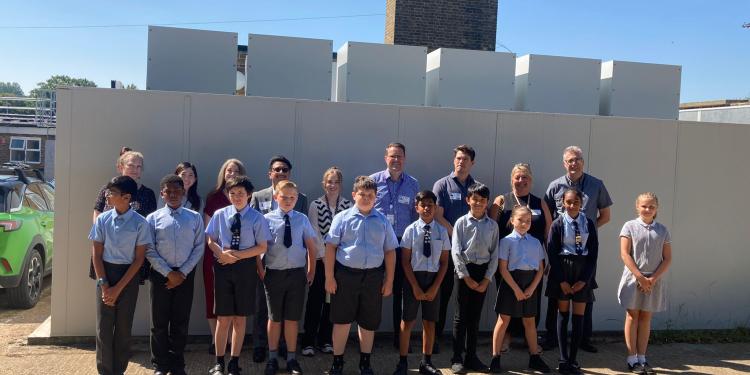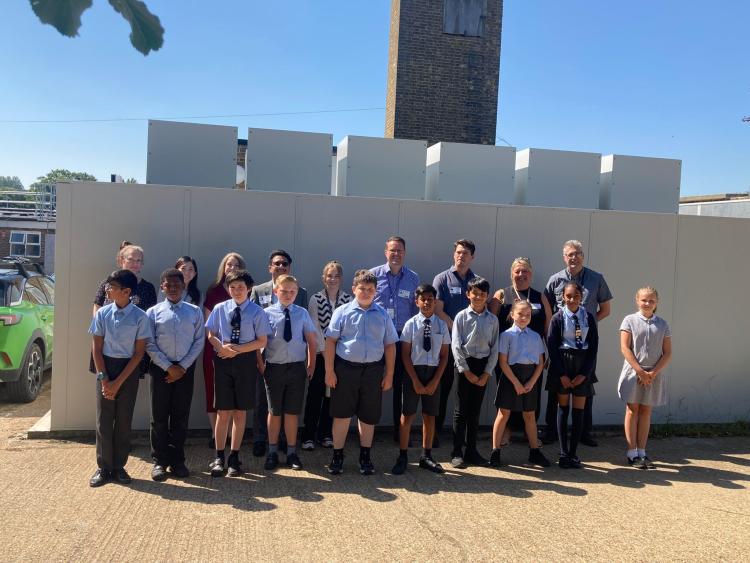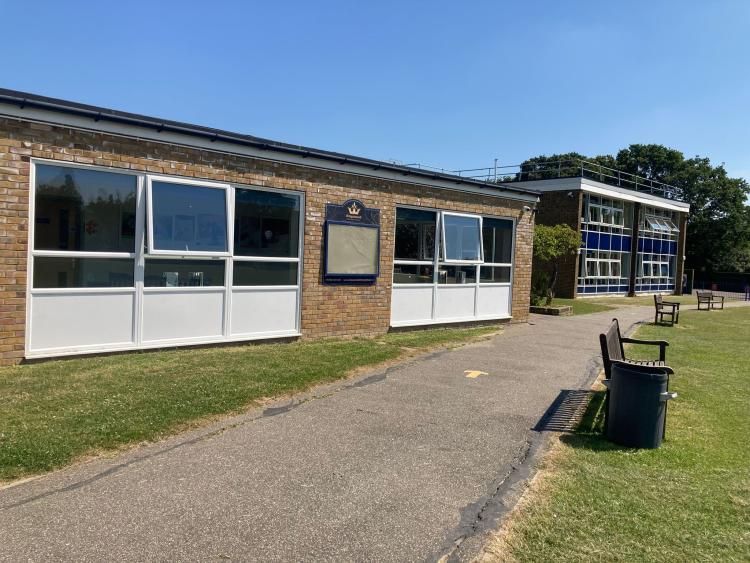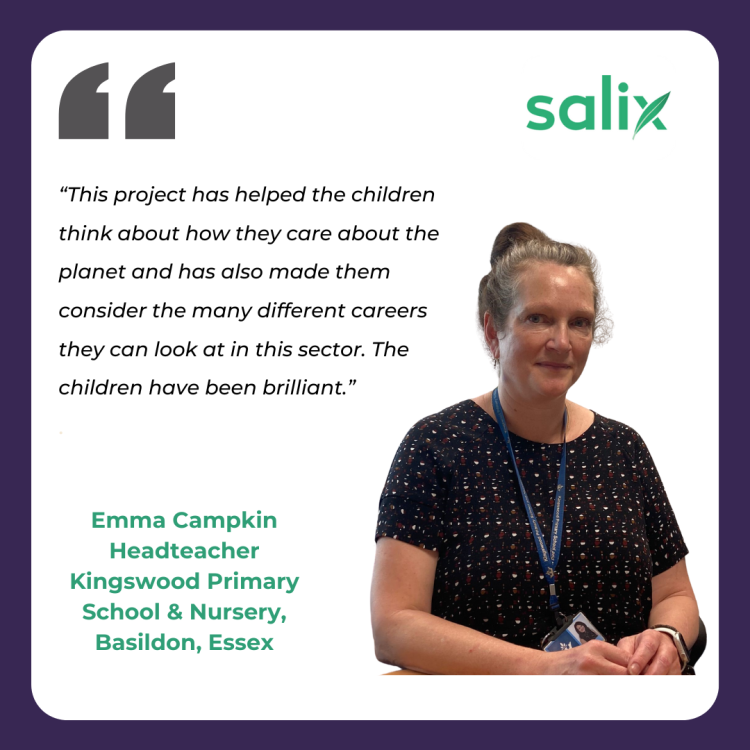Why it’s important to listen to children’s voices

School community gets behind ambitious decarbonisation project and this is how they did it
Children’s voices on climate change are increasingly adding powerful perspectives on all things environmental.
The classroom is becoming a centre of challenge and debate over how governments across the world respond to one of the biggest issues of our time – climate crisis.
At Kingswood Primary and Nursery in Basildon, Essex, the children are certainly on top of the net zero agenda.

Pupils at Kingswood Primary School and Nursery in Basildon, Essex
Credit: Salix Finance
Their 1950s school building is now completely decarbonised thanks to funding under the Public Sector Decarbonisation Scheme, which is part of an Essex County Council initiative to decarbonise its buildings.
Yes, the school is now more energy efficient and can save on bills, but most crucially, the ambitious £2.5m project has heightened interest to make fundamental change for the future.
The children and leadership team invited us into the school to see and hear about how the project has been achieved. How does a busy primary school engage in a large decarbonisation project? We wanted to find out more.
The children are demanding action. It is today’s children and the generations to come who have the biggest stake in the health of our planet and its future. The school decarbonisation project is just the start.

Kingswood Primary School and Nursery in Basildon, Essex
Credit: Salix Finance
School student Avanish, aged 11, said: “We don’t have much time here, but it is possible to change the world.
“Governments need to change the rules, we want more laws to prevent global warming or at least slow it down. The adults need to take more responsibility.”
The school is led by inspirational headteacher Emma Campkin aka Mrs Campkin to the children.
Emma has worked at Kingswood Primary and Nursery for 27 years and is passionately invested in the school. The Public Sector Decarbonisation Scheme project has been a vast undertaking for a busy school with more than 400 children on the register.
However, Emma, who has been headteacher for the last three years, seems unphased by the inevitable disruption to the external site as MITIE contractors and their construction crews and vehicles came and went at the site over the last two years.

Just placing the solar panels on the roof meant a juggling around of student lessons to avoid the noisy installation.
How did Emma navigate the work as well as keep the children on track for academic success? What made this project work?
“The children,” Emma says, “have been brilliant, we’ve listened to them, the children’s voices are key to our greener future and how we develop our school.”
It’s undoubtedly been a huge asset to have Emma’s buy-in. She has a degree in design and technology and is also an artist. She knows how materials ‘work.’
“Having an engineering background has certainly helped,” says Emma.
“I am used to working with resistant materials and as an artist I understand the processes and actions of working this way.
“You also have to be organised for a project like this, everything had to be so well planned, and this is not always easy when you have another job. Our priority is always the education and wellbeing of the children.
“Much of our project was about making constant quality checks and ensuring I was in 95% of the meetings. Communication was so important between the contractors MITIE who were great, ourselves, the parents, children and the council.
“The project had to be well guided, the children had just come out of Covid and all the lockdown restrictions, and when they came back, we were straight into all the construction work with classes being moved around. We had to use the building differently.
“The children are eco warriors, we have a school eco council and they are always coming up with suggestions on how we can better use our energy.
“The project has been incredible also because it has given the children a real insight into their own future careers. They see the different roles that are being created in energy and climate, and they are so open minded about it.
“The children talk about how they can care for one another but also how they can care for the planet, it is all part of the big picture.
“This project is not just about maintaining the school’s infrastructure and decarbonising this building.
“This is about the bigger picture, the building is set for the future, but so are the children. They are using their voices to influence how we use our resources.
“They definitely have a seat at this table.”

Kingswood Primary School and Nursery in Basildon, Essex
Credit: Salix Finance
The achievements have been vast at Kingswood Primary and Nursery School. They now have installed an impressive array of solar panels on the roof along with roof insulation, an air source heat pump, LED lighting and windows.
Whilst the solar PV technology provides sustainable power to the school harnessing the sunlight to generate electricity, the air source heat pump extracts heat from the air contributing to the eco-friendly school environment. The double-glazed windows contribute to the overall energy efficiency of the school making the classrooms more comfortable places to study. And the LED lighting, which consumes less energy than traditional bulbs, has created a better lit area for the kids to enjoy.
To fund the works, Essex County Council has successfully tapped into the Public Sector Decarbonisation Scheme Phase 1 and Phase 3a with works being undertaken from February 2022 to October 2023. The scheme is delivered by our teams at Salix and run by the Department for Energy Security and Net Zero.
However, it doesn’t stop there. Emma is now hoping the school will become a forest school, as the children turn their attention to the outdoors.
There are plans for an allotment and to incorporate the wider community.
Emma adds: “This is about our wider well being and we’re keen to involve families and the community in these ambitions.
“We have a lovely school and wonderful grounds, but we have a commitment to our wider Kingswood family.”
Emma recommends the work to other schools. She says it has strengthened knowledge and skills as well as creating a real vision for the future.
The school has demonstrated positive sustainability leadership which has included a strong and diverse set of skills.
During the works, the school team has continued to create a good learning environment whilst operational staff became fully familiar with the site. The children have been enthused every step of the way, sharing Emma’s vision.
This vision is shared by Facilities Manager at Essex County Council Lisa Freshwater.
She says: “The Kingswood project has gone incredibly smoothly, and this is largely thanks to the relationships between everyone involved.
“It is inspiring to see what has been achieved and lovely to see how the children have been so engaged.”
There is no greater advocate for all of this work than the children – this is their future, and these projects offer an opportunity for them to use their voice.
Emma adds: “The children know why we have had this work done, they understand the purpose and they understand what it means to care for one another and the planet.”
The children here – just like children around the world understand the challenges. At Kingswood Primary School and Nursery they discuss the climate in the classrooms, and they take their messages home.
They’re encouraging families, friends and their wider community to individually take action.
School student Poppy says: “At home I am always turning off the lights, we have to look after the resources we have, we need to prevent global warming, we can certainly slow it down.”
Although the school has made great strides in reducing the emission of greenhouse gases generated through energy use in the school building, there is clearly still plenty more to do. They will now focus on biodiversity, education and adaptation.
In the meantime, the Kingswood children will continue to have a voice here in Essex. They will continue to have a voice at the table and no doubt they will go on and become the leaders and influencers of tomorrow.
We cannot wait to visit again to learn about their next steps and listen to their learning.
Thank you to all the teachers and children Kingswood Primary School and Nursery for hosting our visit. We wish you all the very best with the next steps of your net zero journey.


